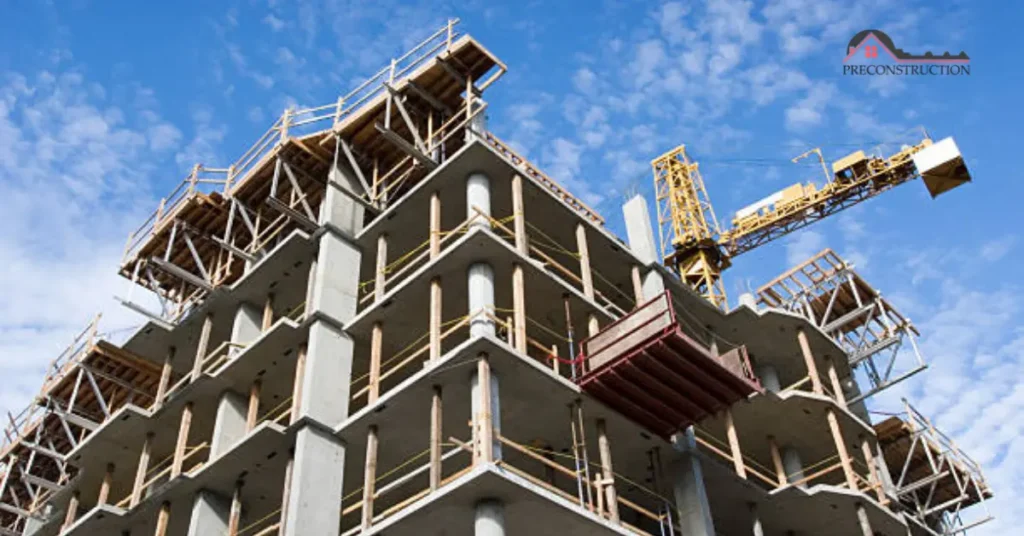Toronto Condo Construction Crisis – Toronto’s condo market, long a central pillar of the city’s housing landscape, is heading toward a dramatic downturn. Once booming with cranes dotting the skyline, the construction of new condominiums has slowed significantly in recent years. And according to industry experts, the worst is yet to come. This slowdown in construction could result in a significant housing crisis in the Greater Toronto Area (GTA), with a sharp decline in new condo developments by 2028.
In this comprehensive blog, we’ll take an in-depth look at the key factors contributing to this looming condo crisis and what it means for Toronto’s real estate market. From soaring interest rates and escalating development costs to political misalignment and shifting market dynamics, we’ll explore how each of these factors is compounding the current challenges faced by developers and, ultimately, Toronto residents. By the end of this article, you’ll understand why the condo market is teetering on the edge of a cliff and what needs to happen to prevent a full-blown crisis.
1. A Perfect Storm: The Factors Leading to the Condo Construction Slowdown
New condo construction in the GTA is experiencing a steep decline, with industry experts predicting a substantial slowdown in the coming years. The numbers tell the story: from an average of 15,000 new condo sales per year over the last 15 years, sales have dropped sharply since 2022, reaching a 27-year low in 2024. So, what’s behind this drop in condo construction?
a) Rising Interest Rates
One of the most significant factors contributing to the slowdown is the rapid increase in interest rates. The Bank of Canada (BoC) has raised its policy rate from 0.25% to 5% over the past two and a half years, a move that has sent shockwaves through the real estate industry. Developers, who rely heavily on borrowing to finance new projects, have found it increasingly difficult to secure loans at reasonable rates.
Ontario Premier Doug Ford’s comments during a press conference in July 2024 hinted at this issue when he claimed that homebuilding would surge if the Bank of Canada lowered interest rates to around 3%. While Ford is not entirely wrong—lower interest rates would help developers secure financing—his statement oversimplifies the situation. Interest rates are only one piece of a much larger puzzle, as other factors are contributing to the construction slowdown.
b) Skyrocketing Development Costs
The cost of building new condos in Toronto has increased dramatically in recent years, thanks in large part to rising development charges (DCs). In June 2024, the City of Toronto quietly increased DCs on condos for the second time in as many months, bringing the total increase to a staggering 42% in just 10 months. These charges, which fund city infrastructure projects, now represent a significant portion of overall construction costs, making new developments increasingly unaffordable for developers.
To put this in perspective, the cost to build a one-bedroom condo in Toronto rose from $37,081 in August 2023 to $52,676 by June 2024. This dramatic increase in development costs has put even more pressure on developers, many of whom have been forced to abandon or delay new projects due to the financial strain.
c) Political Misalignment and NIMBYism
A third factor contributing to the condo construction slowdown is the misalignment between different levels of government and the rise of “Not In My Backyard” (NIMBY) attitudes at both the provincial and municipal levels. While the Ontario government has introduced policies aimed at increasing housing supply, such as consultations on accessory units, other measures—such as the hike in development charges—have counteracted these efforts.
Furthermore, industry experts believe that governments are not doing enough to prioritize housing supply. Richard Lyall, President of the Residential Construction Council of Ontario, has criticized the lack of coordination between governments, pointing out that every new measure that increases costs for developers only exacerbates the housing shortage. Until governments at all levels align their policies and work together to support new housing developments, the condo market will continue to suffer.
2. The Impact of Slowing Construction on Toronto’s Housing Market
The slowdown in condo construction is not just a problem for developers—it has serious implications for the entire housing market in the GTA. With fewer new condos being built, housing supply will tighten, leading to higher prices for both buyers and renters.
a) A Decline in Completions by 2028
The effects of today’s construction slowdown will be felt most acutely in 2028, when industry experts predict a sharp decline in new condo completions. Jared Menkes, Executive Vice President of High-Rise Residential at Menkes, has warned that while completions in 2024, 2025, and 2026 will likely reach record levels due to projects started before the pandemic, the number of new condos completed after 2028 will drop dramatically.
This decline in completions will create a gap between supply and demand, which will drive up housing prices even further. By 2028, the shortage of new condos could be so severe that double-digit increases in both rent and sale prices become the norm.
b) Investors Shying Away
The GTA’s condo market has long been supported by investors who buy units to rent out for income. However, recent trends suggest that investors are becoming increasingly hesitant to invest in new condos. According to a report from CIBC and Urbanation, 77% of GTA condo investors were cash flow negative in 2023, as their mortgage payments outpaced rental income.
With investors facing negative returns and rising interest rates, many are opting to sit on the sidelines rather than invest in new condos. This has further weakened demand in the pre-construction market, leading to a slowdown in new condo starts. Without investor confidence, it will be even harder for developers to finance and build new projects, exacerbating the housing supply shortage.
c) Job Losses and Economic Impact
The slowdown in condo construction also has broader economic implications. The construction industry is a significant driver of Ontario’s economy, providing thousands of jobs and contributing billions of dollars in economic activity each year. Every crane that comes down represents the loss of an estimated 500 jobs, according to industry experts.
As new condo projects are delayed or canceled, job losses in the construction sector will mount, leading to reduced consumer spending and a potential downturn in the overall economy. Richard Lyall has warned that if the slowdown continues, Ontario could be headed for a recession, with the construction industry bearing the brunt of the economic pain.
3. What Needs to Change: Solutions to Avert the Crisis
The looming condo crisis in Toronto is not inevitable. With the right policies and interventions from government, the construction slowdown could be reversed, and the housing market could be stabilized. Here are some potential solutions to avert the crisis:
a) Lower Interest Rates
One of the most immediate steps that could help revive the condo market is a reduction in interest rates. While the Bank of Canada has been raising rates to combat inflation, a more moderate rate environment would make it easier for developers to finance new projects. This would help to kickstart new condo construction and increase the supply of housing in the GTA.
However, it’s important to note that lowering interest rates alone will not solve the problem. As we’ve seen, there are other factors—such as development costs and political misalignment—that also need to be addressed.
b) Streamline Development Approvals
One of the biggest challenges facing developers in Toronto is the lengthy and complex approval process for new condo projects. Reducing red tape and streamlining the approval process would make it easier for developers to get new projects off the ground, increasing the supply of condos and helping to alleviate the housing shortage.
The Ontario government has taken some steps in this direction, such as introducing consultations on accessory units, but more needs to be done. Governments at all levels need to prioritize housing supply and ensure that any new regulations or measures are evaluated for their impact on the housing market.
c) Address Development Charges
The rapid increase in development charges has been one of the most significant obstacles to new condo construction in Toronto. To encourage more development, governments should consider freezing or reducing DCs, particularly for affordable and mid-market housing projects. This would lower the overall cost of building new condos and make it more financially viable for developers to start new projects.
d) Incentivize Affordable Housing
Another potential solution is to offer incentives for developers to build affordable housing. This could take the form of tax breaks, grants, or other financial incentives that offset the high costs of construction. By making it more profitable for developers to build affordable condos, governments could help to increase the supply of housing and address the affordability crisis in the GTA.
Conclusion: Toronto Condo Construction Crisis
The slowdown in condo construction in Toronto is a slow-moving crisis that, without intervention, could lead to a full-blown housing shortage by 2028. The factors contributing to the crisis—rising interest rates, skyrocketing development costs, political misalignment, and shifting market dynamics—are complex and interconnected, making it difficult to address any one issue in isolation.
However, with the right policies and interventions from government, the condo market could be stabilized, and the housing shortage could be averted. Lowering interest rates, streamlining approvals, addressing development charges, and incentivizing affordable housing are all potential solutions that could help to revive new condo construction and ensure that Toronto’s housing market remains accessible to all.
The time to act is now. Without swift and decisive action, Toronto’s condo market will continue to deteriorate, with serious consequences for developers, buyers, renters, and the broader economy.
Explore the latest trends in luxury Miami condos at Brickell Sold, and discover exceptional real estate photography services in Toronto with Click Media Pro. For MLS Listings in Toronto, check out Wedu and the Wedu Blog. Stay informed about the pre-construction market by visiting Preconstruction Info.






